Last updated on 09/11/2015
This is a work in progress. If you see anything interesting in the meeting material please post a comment. Live-blog for Sept 11th here.
Also see Reporter Noah McGraw’s post on the upcoming meetings in the Daily Emerald, here, and check his live-blog here.
Great news! The trustees are now live-streaming their meetings, here. Now if Kevin Reed will just fix the public records office, I can finally end this damn blog.
Highlights from Sept 10th:
As of 10:30, not much. The Exec committee agreed to tone down their counter-attack on free-speech on cheerleaders.
Slusher talks about Mariota center. Board tries to connect this to research, Slusher doesn’t bite – it’s about applying existing knowledge to winning games.
No serious questions about Hayward field tart-up.
OUS settles with SEIU, and Moffitt presents budget for 2015-16. Turns out she did have the money for faculty raises after all. What a surprise. She’s worried about 2016-17. What a surprise.
1:00PM, full board meeting. They’ve rearranged the room so as to keep the unwashed as far back as possible.
In public comments, students not excited about tuition guarantee idea.
More on how to deal with HECC, faculty hiring plans at bottom.
Page down for schedule and live-blog.
Schedule:
Thursday Sept 10th:
8:30-10:00 am: Executive and Audit Committee [Materials] Public Meeting, Ford Alumni Center, Room 403
10:00 – 11:30 am: Finance and Facilities Committee [Materials] Public Meeting Ford Alumni Center, Room 403
10:00 – 11:30 am: Academic and Student Affairs Committee [Materials] Public Meeting Ford Alumni Center, Room 202
1:00PM – ? Full BOT meeting [Materials]Public Meeting Ford Alumni Center, Giustina Ballroom
Friday Sept 11th:
9:00AM – 12:15 Full BOT meeting [Materials]Public Meeting Ford Alumni Center, Giustina Ballroom
12:15PM: Executive BOT meeting on labor negotiations.
Live-blog: Disclaimer: Everything is my opinion based on what people said, what they meant, or what they should have meant.
Executive and Audit Committee — September 10, 2015 [Materials] 8:30 am: Public Meeting, Ford Alumni Center, Room 403. Convene – Call to order – Roll call
1. Approval of June 2015 EAC minutes (Action)
2. Audit, Chief Auditor Brenda Muirhead
2.1 Quarterly and year‐end audit reports
2.2 Introduction of Internal Audit peer review processes
No materials posted. The auditors are working on an audit of the athletics department, IT is on track, should be done by December and issued to leadership. External peer audit, asking for thoughts on how to proceed on internal v. external.
Q about Fraud and Ethics hotline. Trustee wants to make sure there’s a way to report improprieties. Another asks haw you tell people what to report? [I’ve used this to report that Chuck Triplett’s hire was done in violation of the AAEO rules. No action.]
Ralph asks how do you report ideas for efficiency? Muirhead: We’ll have something for that.
3. Board operations, Board Chair Chuck Lillis
3.1 Trustee responsibilities and expectations (Action)
Diane Dietz has the story on trustee absenteeism in the RG, here. The bylaws changes (pages 9-10) about trustees advancing the UO mission and upholding board integrity seem intentionally designed to chill free speech and discussion such as we’ve heard from Ginevra Ralph. I don’t get the motivation for these changes. We’re a university, we like different opinions.
Lillis: In spring Angela circulated self-evaluation forms. Over the last year issues have come up regarding trustee behavior and on how we select next chair. These motions will go to the entire board.
My post attributing this motion to a desire to limit Ginevra Ralph’s welcome outspokenness is here:

Ralph: Onsite participation is important, but so is diverse input from people who can’t necessarily be here in public.
Susan Gary reads statement on the proposed change saying that “faculty … should be mindful of their responsibility to the institution as a whole”. Gary has kept the faculty in the dark about many board actions, and the Senate voted to have an open process to nominate a replacement. Governor Brown ignored this and reappointed her without consulting the faculty. This is very different from the normal procedure used for boards. Here’s the UO Senate motion calling for a more transparent process, it passed unanimously.
Kurt Willcox: Speaks against the motion. This motion was inspired in part by Helena Schlegel’s opposition to tuition increases. She thought this was in the best interest of the university. Why is it a problem for her to speak about this? Same with my support for UO’s low paid staff. Do you really want to encourage us to be silent on this.
Lillis: It’s a delicate issue for Gary, Willcox, and Schlegel. [And not for the rest of the board?!] Kurt, are you happy with current language?
Ralph: I actually agree with Kurt. For example, on the cheerleader issue I was talking for myself, not with the board, obviously. Maybe there’s a better way to write this without singling out Kurt and Helena?
Ross Kari: Wants the changes with some wordsmithing.
Lillis: Can we pass this subject to some wordsmithing? [Why not kill it subject to wordsmithing. Never a good idea to draft language on the fly – but this still has to go to the full board for approval.]
Motion to adopt some sort of change passes, will go to Board.
3.2 Process and clarifications regarding board officers (Action)
If I read the current bylaws correctly the board should have an election for chair at this meeting. Instead, they are going to vote for a change in the bylaws that would automatically give Chuck Lillis, the current chair, another year in office. Normally a change in terms would take effect after the current office holder’s term expires, but I don’t see any such qualifier here:
Lillis: This is not reflective of any personal ambition.
No real questions, approved unanimously to go to full board.
Kurt Willcox: Question about the new format for board meetings. Doesn’t like the fact that there’s now only 2 days, and committee meetings overlap. Means board members (and press!) can’t keep up with all the issues. Urges executive committee to keep the 3 day schedule. Also doesn’t like new public comment format. Should be scheduled so as to be accessible to UO staff who have to schedule time off.
Lillis: I decided it was a priority for the board to learn more about academic issues, so I wanted to schedule those first.
Mary Willcox: I do agree with Kurt about the simultaneous meetings, but really like the 2 day meetings. Need to be creative about fixing this.
Allyn Ford: Complex issues, difficult to keep focus on all of them. Need to specialize. Two days max. OK if that means we lose some detail.
Susan Gary: I agree with Kurt. I agreed to be on one committee only because I knew I could also attend the other meeting. Now I can’t.
Helena Schlegel: Agree with Kurt on public comment. We need to have this scheduled, out of respect for the people coming to talk to us
9:26 am: Lillis: OK, motion to adjourn? Adjourned.
10:00 am: Finance and Facilities Committee — September 10, 2015 [Materials] Public Meeting Ford Alumni Center, Room 403. Convene – Call to order – Roll call
1. Approval of June 2015 FFC minutes (Action)
2. Public comment
Francisco Morales-O’Connor, ASUO exec, speaking on guaranteed tuition program. Concerned about including i-fee, concerned that there by student input particularly regarding impact on non-traditional students.
Joaquin Ramos (thanks to commenter for name): Doesn’t want i-Fee included, is concerned that it will make it more difficult to organize students to oppose tuition increases. [Which is exactly why the administration is interested in it.] Also worried that it will hurt the average student who takes 5 years to graduate. [Good point – the incentives will change to get students done more quickly, however.]
3. Quarterly reports
3.1 Q4 financial report, Vice President for Finance and Administration Jamie Moffitt
A few meetings back several trustees asked VPFA Moffitt to break out the financial reports in more detail. If that’s happening, Board Secretary Angela Wilhelms isn’t putting it into the public record. The Duck athletic budget gets blended in with “auxiliaries” like food service and parking. Why not just come clean?
VPFA Jamie Moffitt: As you can see we have a positive total amount, but that’s including athletics. For Educational and General (i.e. academics), we are about $10M short, and about 6.5M that’s recurring. On the positive side, our fund balance is growing substantially. This is because the UO debt the state has been paying will go off our books due to accounting change.
On E&G fund: As you can see, I’m not breaking out athletics. On the academic side, we’ve had to reduce tuition revenue due to slight drop in enrollment, lower number of credits, and students dropping out. $6.5M out of $400M budget.
We can handle this for a year, I’ll show you projections for next year later. [Are these in packet?]
3.2 Q4 treasury report, Director of Treasury Operations Karen Levear
This job is all about balancing the timing of UO’s revenue and expenditures.
It all seems well managed. I’m no time-series econometrician, but I think the interesting part of this graph is the positive secular trend, not the cyclical component. But what are those June 30th-July 1 jumps about?
Karen Levear: That’s because we make our bond payments at the end of the FY year. OUS used to let us slide for a month, but now we pay it promptly. FY 16 is a bit weird too because the state was late giving us our cash. Also, we’ve good earning on cash balances, we’re going to move more of it into “quasi-endowment” and get 4% or so, depending on how well Jay Namyet at the UOF does in the market, less his fees of course.
 4. Capital projects
4. Capital projects
4.1 Capital improvement agreement: Marcus Mariota Sports Performance Center, Phit, LLC
representative Howard Slusher (Action)
The board needs to vote on “instruments relating to real property where the anticipated value exceeds $5 million and for the acceptance of a gift of real estate and/or gifts that create obligations on the part of the University for which there is no established funding source, respectively.”
Howard Slusher is presenting this. Wow. Back in the day Slusher was the sports agent who crushed the NFL owners association’s hiring cartel and made it possible for athletes to play for the team that offered them the most money. Before Slusher, the owners didn’t just own the teams, they owned the players too. They set the salary and if a player didn’t like it he could always try selling used cars. The players loved Slusher, and the owners hated him for taking “their” money. My Dad, a former baseball player, was for Slusher and so was I. I can’t wait for Ed O’Bannon’s lawyers to do to the NCAA cartel what Slusher did to the NFL owners.
Now Slusher works for Nike. He negotiated the purchase of the Matt Court Arena land from Williams Bakery, though I’m not sure if he was part of the Frohnmayer/Kilkenny deal to make the students help pay for it. He also negotiated the deal for the Jock Box, and those astonishingly detailed gift agreements are here:
- License agreement, Dyke and Knight, 1/8/08 (UO leases land to Phit, to allow no-bid construction.)
- Amendment 1, Frohnmayer and Knight, 1/8/08 (UO to pay for parking, computers, staff.)
- Amendment 2, Dyke and Slusher, 7/31/2008 (UO can’t use extra space but must pay 2/3 cost of landscaping it)
- Amendment 3, Dyke and Slusher, 4/1/2009 (UO to pay for SEED energy improvements)
- Amendment 4. Dyke and Slusher, 4/1/2009 (The contractor for the Academic Center has contracted with UO for the Arena and Parking Garage. Weird, not sure what that’s about.)
UO has to provide parking, computers, tutors, etc. Again, it’s not clear if Slusher knew that this $2M a year in operating costs would come from student tuition. Maybe he thought athletics would pay? No such luck, it’s coming out of the Provost’s budget, with Duck booster Lorraine Davis in charge.
Here’s People Magazine on Slusher, in 1985:
Howard Slusher, Sports’ Least Secret Agent, Strikes Fear and Loathing in the Hearts of Team Owners
Now it’s Howard’s turn to be feared. So poisonous is his reputation among some of America’s wealthiest sports-franchise holders that the unyielding L.A. attorney is almost better known by his pseudonym, Agent Orange. Slusher has become famous—in some circles, infamous—for having his player-clients hold out and keep holding out until they are offered the serious-money contracts they seek. His all-star stable has included the likes of San Diego Chargers quarterback Dan Fouts, who held out more than half the season in 1977 before receiving $1 million a year for six years, and basketball star Joe Barry Carroll, who left the Golden State Warriors to spend last season in Italy before being lured home with a five-year contract calling for at least $5 million, plus a $2 million signing bonus.
Howard Slusher:
Slusher: We’ve got permission from Mariota to name this building after him. [I wonder if he made the Ducks pay? Nah, his agent probably just folded it into his Nike deal.] It’s about using science to help the coaches manage the athletes. He shows $1000 monitoring bracelet. He goes on and on. Special center for doing cognitive rehabilitation for concussed athletes. Special nap room for players to take 20 minute naps, except the cots will cost $8K plus. Then they get a massage.
[This is getting a little, uh, obsessive. Crowd is starting to giggle.]
We can start tomorrow – or at least January. We need you to approve this now. Phil Knight will be the responsible party. We build it, give it to university. Questions?
Susan Gary: You mentioned it wouldn’t involve basic research. Slusher: Yeah, Schill asked me about that too. Human Phys would love this. But it would interfere with the goal of winning games. But maybe we can do something.
Ralph: 99% football? [What about concussed women lacrosse players?]
Rob Mullens: All sports, priority to football.
Lillis: Softball question about financial checks and balances.
Moffitt: I’m heavily involved in negotiating the license agreement. Athletic department is responsible for operating costs, so this will insure they can spend more on themselves, and have nothing for the faculty. That’s our deal with Rob Mullens. They keep what ever they earn, and whatever they can steel from the academic side.
Moffitt then does reveal that there are “higher level discussions going on about the athletics budget and its contribution to university overhead.”
Schill: Leading question about how this will bring attention to the problem of protecting athletes from injuries, concussions?
Slusher: [Not sure if he understood the point of the question.] Here’s the report from the $1000 monitoring bracelets. See how it shows if he’s not performing up to snuff? If they’re not, the device tells them to do extra push-ups or whatever.
Rob Mullens chimes in, but he didn’t understand the point either.
Lillis: Softball on connecting this extravagance to some research goal. Mullens says they’re already doing this.
Approved.
4.2 Capital improvement agreement: Hayward Field, University of Oregon Foundation
President and CEO Paul Weinhold (Action)
Having replaced Mac Court with a soulless corporate big-box that the fans hate even more than Dana Altman, now our boosters want to tart up Hayward Field.
Paul Weinhold, CEO of the UO Foundation presents. Great, another way to distract the foundation from academic issues.
Weinhold: Foundation is taking this on because of the tight timeline and because the university is busy. Complete around October of 2017. Space for Human Phys will be tripled, under the new grandstand.
Ross Kari: We haven’t seen any documentation, so we’re going to vote on putting Schill in charge of the details, because it’s not like he has anything academic to worry about.
Approved.
4.3 Academic building projects: Chapman Hall, College & Careers Building, Klamath Hall,
AVP for Campus Planning and Real Estate Chris Ramey (Action)
Half funded by the state, half by donors. I’ve made a public records request to Angela Wilhelms for the gift agreements – nothing yet.
Chris Ramey presents: Legislature approved funding for these buildings and new money for deferred maintenance.
Chapman Hall: $8M from state, $2M from donors.
College and Careers: Located in JH parking lot. $17M from state, $17M in gifts. $10M from Tykeson family in hand.
Klamath: Renovate top floor for science labs.
Lillis: Can we start even without funding in hand? Moffitt: yes, with board approval. Lillis: How long to finish. Ramey: about 2 years.
Lillis thanks Ramey for his service to the university and congratulates him on his retirement. Ramey: Actually, I really hoping I can keep working for the university.
Board approves.
5. Fiscal Year 2016 budget, Vice President for Finance and Administration Jamie Moffitt
(Action)
UO is going to have a budget? Well, almost. Still need to finish the SEIU contract negotiations.
Breaking news: OUS has settled with SEIU!
So UO now has a budget:
Schill: Jamie, please explain that student aid has not really gone down.
Moffitt: True. These are scholarships. We also give $28M or so in fee remissions, from general fund. Overall we’ll give out more student aid this year than last.
Lillis: So, how much in total? I asked Jim Brooks. Can you or Roger prepare a report to the board on that? $170M in federal aid? Wilhelms: We’ll get that for the Dec meeting.
My takeaway: Everything’s fine, Education and General revenue is up about $21.5M, expenses $22.4M. Search through Rob Mullens’ pocket change and we’ll have enough money to move academics ahead.
Moffitt’s takeaway: We’re fine this year, plenty of reserves, but year after this will be trouble, and no money to hire needed new faculty.
6. Tuition and fees
6.1 Earlier student input in the tuition‐setting process, Vice President for Finance and
Administration Jamie Moffitt (Action)
The tuition setting process is supposed to include student involvement. Last time this was a sham – VPFA Moffitt wouldn’t share the financial data. The students protested – including a large contingent of Chinese students, who really know how to protest. I thought the board handled the demonstration very well, but understandably they’d rather not go through that again.
6.2 Tuition guarantee concept, Vice President for Finance and Administration Jamie Moffitt
and Vice President for Enrollment Management Roger Thompson
Diane Dietz has this covered in the RG, here. My blogging will be light.
Moffitt intro: Not a formal proposal, we’re just exploring this and want the board to tell us if we should keep studying it.
Roger Thompson presents.
Some trustees are intrigued and ask for more study, lots of skepticism on details.
Helena Schlegel (an economics major, of course) reports that current students are not very enthusiastic. Appreciates the incentive for timely completion, notes that the need to increase tuition in year one to keep average cost flat will discourage low income students from even starting college.
And the anecdotes start to fly: My child went to college ….
Academic and Student Affairs Committee — September 10, 2015 [Materials] 10:00 am: Public Meeting Ford Alumni Center, Room 202
(Sorry, no live blog on this meeting, conflict with facilities meeting. Page down for full board meeting.)
Convene
– Call to order
– Roll call
– Introductory comments and agenda review
1. Approval of June 2015 ASAC minutes (Action)
2. Public comment
3. Student Conduct Code
Outdated IMD repeal and UO policy consolidation, University Secretary Angela Wilhelms
4. Overview of academic organizational structure – roles and responsibilities, Senior Vice
President and Provost Scott Coltrane
5. Overview of Portland‐based academic programs, Interim Vice Provost for Portland
Programs Jane Gordon
6. Class size and classroom utilization, Senior Vice President and Provost Scott Coltrane
Meeting Adjourns
Meeting of the Board — September 10-11, 2015 [Materials]
1:00 pm (other times approximate) – Convene Public Meeting
– Call to order, roll call, verification of quorum
Could they possible have kept the faculty any farther away?
– Opening remarks by Chair
Lillis introduces President Schill, presents gift to outgoing Doug Park, welcomes new VPGC Kevin Reed and Strategic Communicator Kyle Henley, thanks Scott Coltrane for hanging in there.
1. Approval of Minutes from June 2015 Meeting
2. Academic Presentations
2.1 School of Journalism and Communication – Julie Newton, Interim Dean
Sorry, the slides in the docket are just a bit too data free for my tastes. Here’s some IR data on majors (just seniors). Mostly Advertising and PR, not much journalism any more. They did just hire Brent Walth though. And UO has produced some excellent student journalists over the years, as demonstrated for example by their investigative reports in the Emerald.
UO IR is predicting a decline in SOJC enrollment, not sure why:
Ann Curry: While journalism is under attack financially, there is great demand for the skills that journalism requires. And journalism students can get a very well-rounded education by taking courses in other departments, so they have a background in the subjects they will write about.
Curry asks question about what’s to come. Newton: We are like a startup, teach a course in media entrepreneurship. And as you mentioned, our students take many courses outside the school focusing on content.
2.2 Humanities (CAS) – Andrew Marcus, Interim Dean; Karen Ford, Associate Dean for Humanities.
Andrew Marcus introduces with idea that a liberal arts degree is the path to an informed, successful, better life.
Karen Ford gives an excellent talk on trends and on what a liberal arts means. Critical thinking, reading writing well. Tenure track faculty teach 5 courses per year, and the standard for tenure is a sole authored, peer reviewed book. (UO faculty write a lot of books, as President Schill has discovered.)
Here’s the IR data on senior majors, by dept, followed by other CAS colleges. Note that Humanities is a shrinking percentage of UO students.
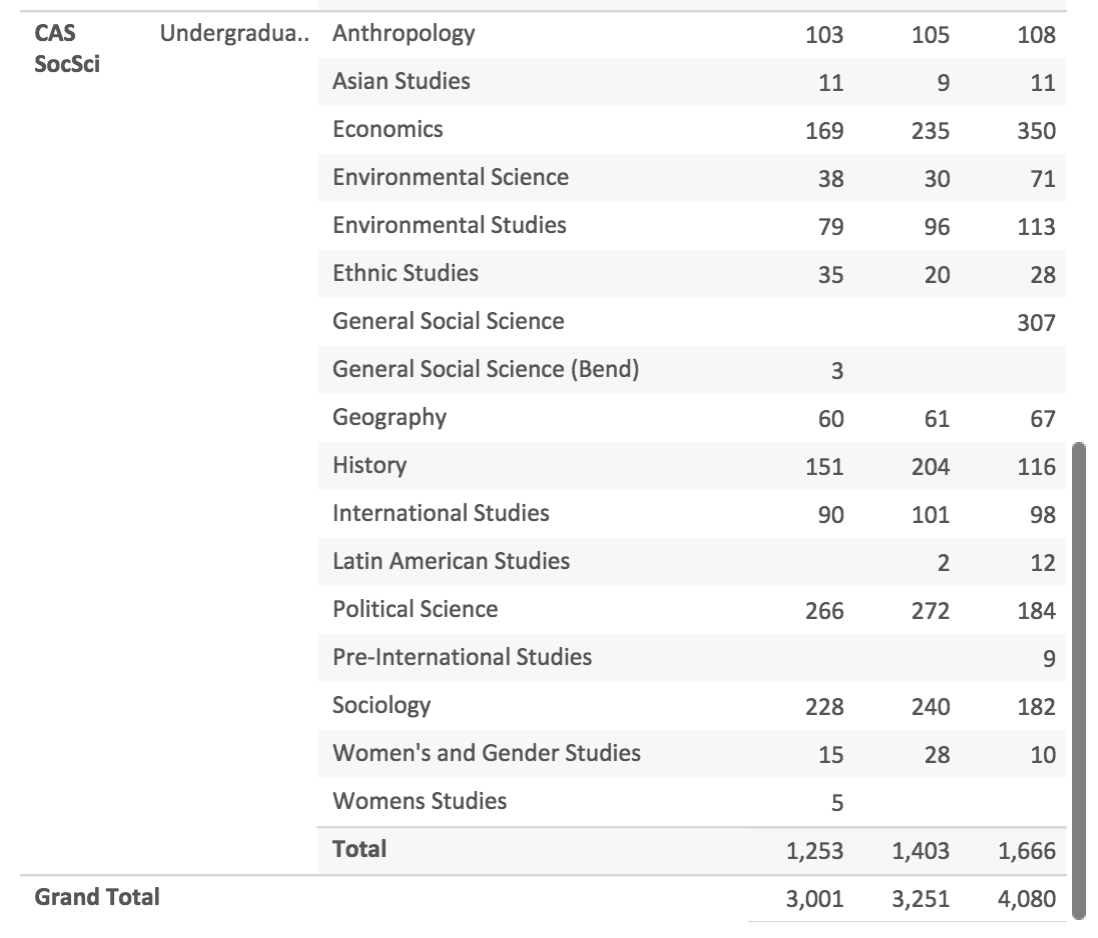
Ford makes the point that liberal arts teach the skills that will be needed in the future – i.e. not easily programmed or performed by a robot. They are working on how to get that message across to incoming students and their parents.
Curry: Excellent presentation, humanities is a core area that defines us as a university and as people. We need to double down on the part of education that teaches us how to think. She mentions a class she had taken in folklore transformed how she thought…
[Sorry, I’m losing it, remembering a course a folklore class I sat in at Columbia in 1979. Quick google trip – it was from Theodor Gaster, and apparently he was famous. He was certainly memorable – he assigned paper topics by passing around a hat with slips of paper with the titles in them. One said “The Jolly Green Giant”. My friend got the one that said “No paper. Come to my office at the end of the semester and tell me what you learned.” He spent the rest of the course in terror.]
Trustee Peter Bragdon notes: I do a lot of hiring. I want people with flexible skills, because I never know how the job will evolve. So I look for liberal arts majors.
Andrew Marcus agrees, puts in pitch for fact that the new College and Careers building will help do this. [Plus give the CAS administration a nice new suite of earthquake-proof offices. Not that I’m jealous.]
3. Public Comment. Those wishing to provide comment must sign up advance and review the public comment guidelines either online (http://trustees.uoregon.edu/meetings) or at the check‐in table at the meeting.
SEIU and UO Staff member McCutheon speaks about low wages for staff, and the difficulty in living on them.
ASUO finance committee chair Stephenson opposes the fixed tuition plan. Notes that it will require a very large increase in tuition for freshman, and UO will lose out-of-state students, like himself.
Exec Director of Hillel Center Andy Gitelson and Pres of UO Student Religious groups gives background on how Hillel and other student religious groups serve to help students with their faith and development of leadership skills, etc.
Classified staff member Dorothy Attneave talks about classified bargaining. When she signed up to talk she did not know that bargaining would be wrapped up (as of 3AM today). Talks about how difficult the bargaining process is. She lived in west africa, where you bargain for everything, and where it’s anti-social to take the first offer – because that ends an entertaining social interaction! But that’s not how bargaining with OUS has gone. It’s taken 8 months, hurt the faculty and staff and their relationship with the administration. No respect. Insulting refusals to discuss proposals – not tough bargaining, just a waste of money. Hopes that the board will give some thought to your real aims during the bargaining process and use it to strengthen the university’s social fabric.
Casey Edwards, ASUO Director of Staff: Talks about i-Fee and how including it in freeze would take away student authority. Also worried about effect of initially higher tuition and fees on low-income student’s ability to come to UO.
Lillis: There is no proposal for a 10% increase. We are just studying it. Edwards: The 10% number comes from talking with Jamie Moffitt. Moffitt: We didn’t give an explicit number, but in an effort to not have to have another surprise demonstration from angry students we did talk to the ASUO and tell them it would be somewhere in that range.
Student: Wants to encourage board to change the rhetoric about tuition freeze and 4 year time to completion. I’m a survivor of sexual assaults and even with Pathways support I can’t take a full load while also working to support myself. Did not feel that the board represented me today when talking about tuition.
Student: As a student with learning disabilities, it is very difficult for me to take 12 credits, unrealistic for me and many other students to graduate in 4 years.
Lillis: We’ve heard lots of feedback on how carefully we must proceed on this, if we do. It’s a good reminder. Thank you.
5. President’s Report
Schill: I’m beginning my third month, I’ve met with everyone. Governor, students, trustees, staff. Even went to a football game. Met with RG yesterday for editorial meeting. Asked me what was the biggest surprise. For me it was the tremendous passion about the university. People feel invested. Mission is to not let them down and let the university down. [OK, I can’t type fast enough. Watch the video for details.]
His goals:
- Build tenure track faculty and academic and research profile. Must invest in academics. Over 4-5 years hire 100 new faculty, and build facilities. Not just sciences, but all through the university.
- Enhance affordability for students. We will have different views on how to do this. But rather than focus just on tuition, we will also look at time to graduate. Need to get our graduation rate up from current embarrassing level of 50% for 4 years, 68% for six. Do the math: this will mean a huge reduction in costs to our students.
- We are hear to teach, provide students with an environment where they can flourish. Great classes and faculty. Also an environment where students can learn from each other. A diverse environment in all dimensions – race, political affiliation…
All consistent with the draft strategic plan. We will work with Senate, and put together a financial plan to achieve these objectives. (A financial plan? That’s a great idea!) Budget is tight, so we will not revisit tuition increase. We will commit new state money to student assistance, like grants, advising, and Pathway Oregon.
Very happy to have new VPGC Kevin Reed here, he’ll start Oct 5. Gives shout out to Doug Park and Kyle Henley from Colorado State. I knew him from before. He is the right guy. Will broadcast the greatness of the school and faculty to the world, not just react to the latest athletic disaster. [Now how many days overdue?] Also introduces Greg Stripp, whom he stole from Moffitt, praises Coltrane.
We’ve made progress on sexual violence. We settled lawsuit so we can move forward. We’ve reorganized how we handle complaints. Hired new staff. I’d love to tell you we will have zero events, but we will have best response possible. New SAAC advisory council. [Aargh].
We settled faculty and staff negotiations. Delighted I do not have to spend my first year in opposition to the people who make the university work.
We got $9.1M more from state, but that’s not even enough to recover from recession.Oregon is #47 among the states – behind Mississippi. [And what, #2 in athletics spending?]
Campaign: We can’t have a great university built on tuition and state funding. Need philanthropy. Crazy, ambitious campaign to raise money for academics, instead of just paying for Rob Mullens’ and the football coaches bonuses and their glitzy new sports crap. [OK, I made up that last part.]
Curry: Of the $2B, how much will lead to sustainable decreases in student costs?
Schill: We are trying to get people to donate significant money for endowment for faculty and for buildings to house them. Students are not going to get quality education free. Tuition will go up every year. But we’re going to moderate that by getting money for scholarships to help low income students. I went to Princeton. Tuition was very high. The rich kids paid it. Not me. I was a poor kid, so I got a scholarship. [OK, I made up some of this. But right on: soak the rich and subsidize the poor students.]
4. Faculty and Administrative Recruiting Efforts
President Schill and Provost Coltrane will update trustees on the university’s current hires and
recruiting efforts relating to senior leadership, cluster initiatives and faculty positions.
Coltrane: 4 deans and VP for research Will post search committees soon. We will have external searches, so we will use 5 different search firms. All these committees have a majority of faculty. All searches will be confidential, airport interviews, we will bring 3-4 to campus for fully open process. Fact that we’ve got a credible president now will help us hire. People see us as an up and coming university.
Faculty hiring: We’ve recently been adding TTF at about 15 a year, net. [Actually, about 10 per year, over last 10 years. Here’s the FTE data from IR:]
Coltrane: We’re recruiting for cluster hires. [Say, where’s the money Lillis said we’d get for those sports product design hires?]
Many probing questions from trustees on the faculty hiring process. Interesting. Coltrane does a good job explaining how it works.
Colas asks about hiring minority faculty. Coltrane explains some of the difficulties – as in very few candidates.
6. HECC Evaluation Framework
Provost Coltrane will update trustees on a statewide university evaluation framework
established by the Higher Education Coordinating Commission (HECC), discussing the
institutions’ perspectives on the framework and issues relating to its completion.
Coltrane presents. See the docket, page 47. I like this part:
Schill: Competition is what made this country great, not monopoly. I think the marching orders from the UO Board to me are to cooperate, but do what’s best for UO unless it hurts the state. Right?
Lillis: Right.
Coltrane: We are doing some things that might be construed as competition, e.g. with PSU. We are consulting with HECC to avoid problems. Example: OSU wants to launch PhD program in Women and Gender Studies – which has been a UO speciality for many years. We’re the natural place to have the monopoly on this, but I voted in favor, given that we reserved the right to do the same. Next meeting our Prevention Science proposal came up. OHSU objected because it sounded like public health, which is their monopoly. We got it through anyway, after explaining how it differed. State’s objective of using their resources efficiently made more sense when they were spending their resources.
Schill: So, my plan is to let Coltrane deal with HECC since he’s got a better temperment.
7. Oregon Legislative Update
AVP for State and Community Affairs Hans Bernard will provide trustees with an overview of the
2015 legislative session, which adjourned in July 2015, including budget information as well as
passed – and merely proposed – policy bills.
Bernard: Our priorities were less state control and more state money. We got 3 of 4 construction projects. [We never do well on this. Legislators ask why the state should fund UO buildings when Phil Knight is loaded and wiling to pay for any sort of athletics junk.]
We committed to legislators that we’d use the new money for faculty hires, Pathways grants for students. We go back in Feb to ask for more, must demonstrate we’ve spent this well.
We explained to legislators that we needed tuition increase and independence to satisfy the bond raters, and this argument worked.
Curry: Congratulations on your success. Given the legislature’s interest in low tuition, should we argue that in exchange for state money we will keep tuition low?
Bernard: Legislators did ask us about this. We said that the authority needed to stay with the trustees. Maybe the board would make an agreement with legislature, but we can’t give up power to set tuition.
Schill: I agree. We’re a bargain.
[Me: Why all this talk about the tuition rack rate – from both the students and the board and the legislature – and so little about discounts like Pathway Oregon that affect the real price that student pay?]
Kurt Willcox: I agree we’re not going to get much more money from the state. Long term problem, because of property tax limitations. So perhaps we should do what we can, as a board, to advocate for state tax increases. [I’m guessing this board is not going to do that, and I’m guessing Willcox knows that!]
Lillis: Our #1 priority, as a board, when we got into this, was to improve UO’s academic ranking, despite low state support. It still is.
4:56 PM, Meeting Recessed. Back at 9 on Friday with Governor Brown, live blog here.
Trustees will accompany AVP for Campus Planning and Real Estate Chris Ramey on a site visit of Klamath
Hall and Chapman Hall, two buildings set for renovation.
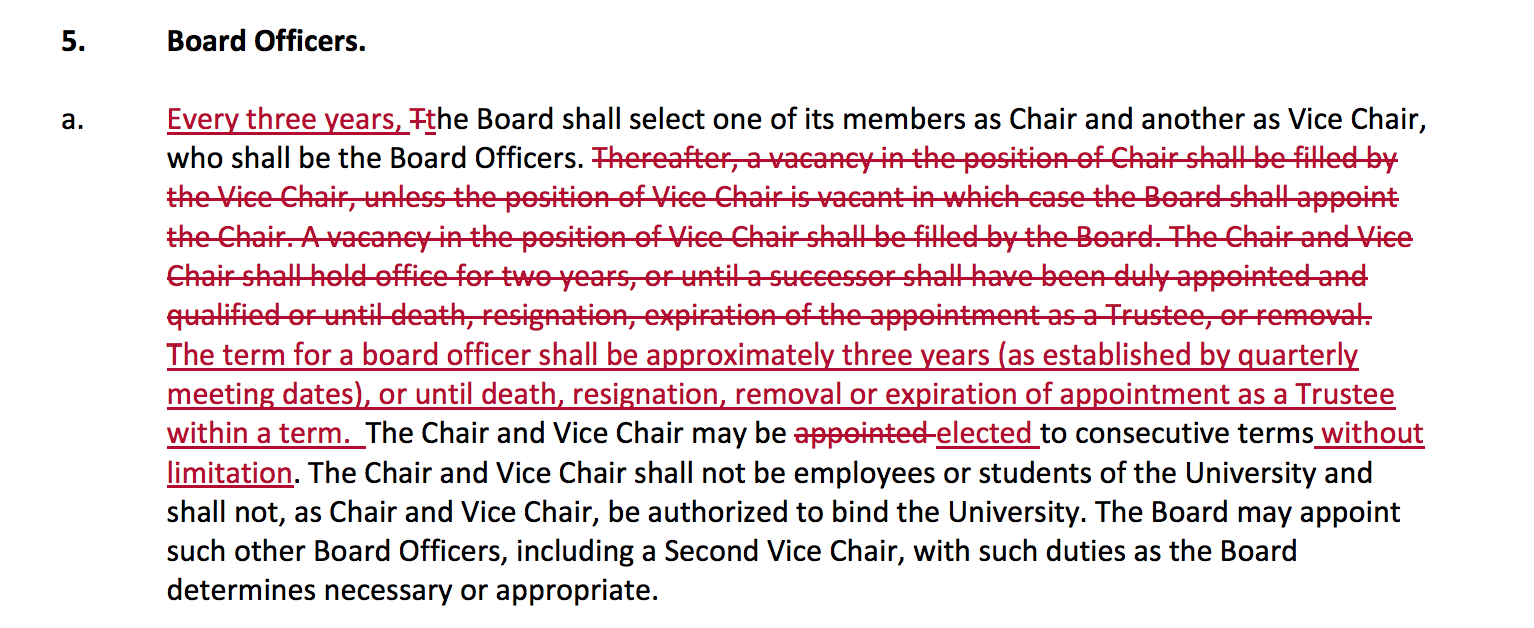
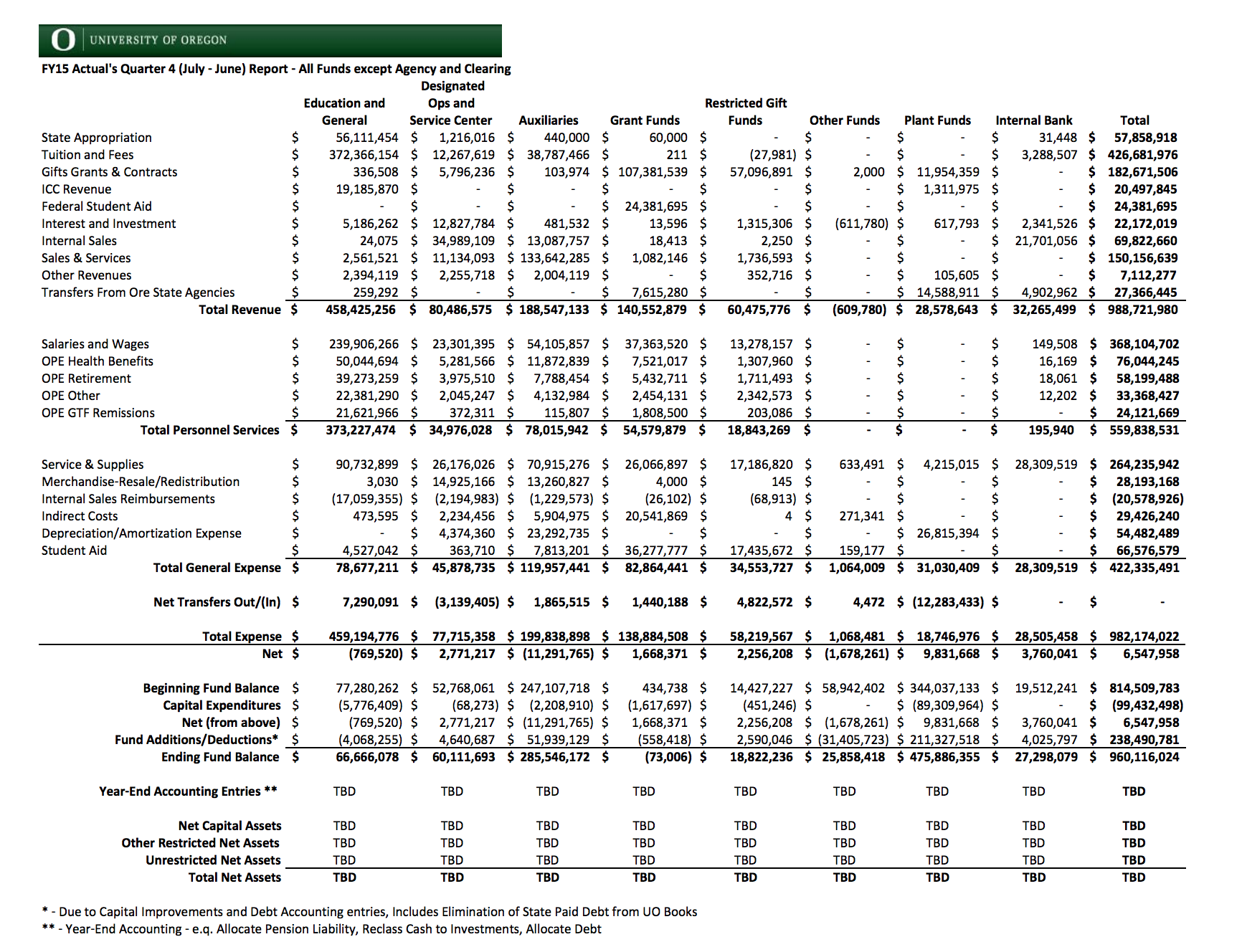
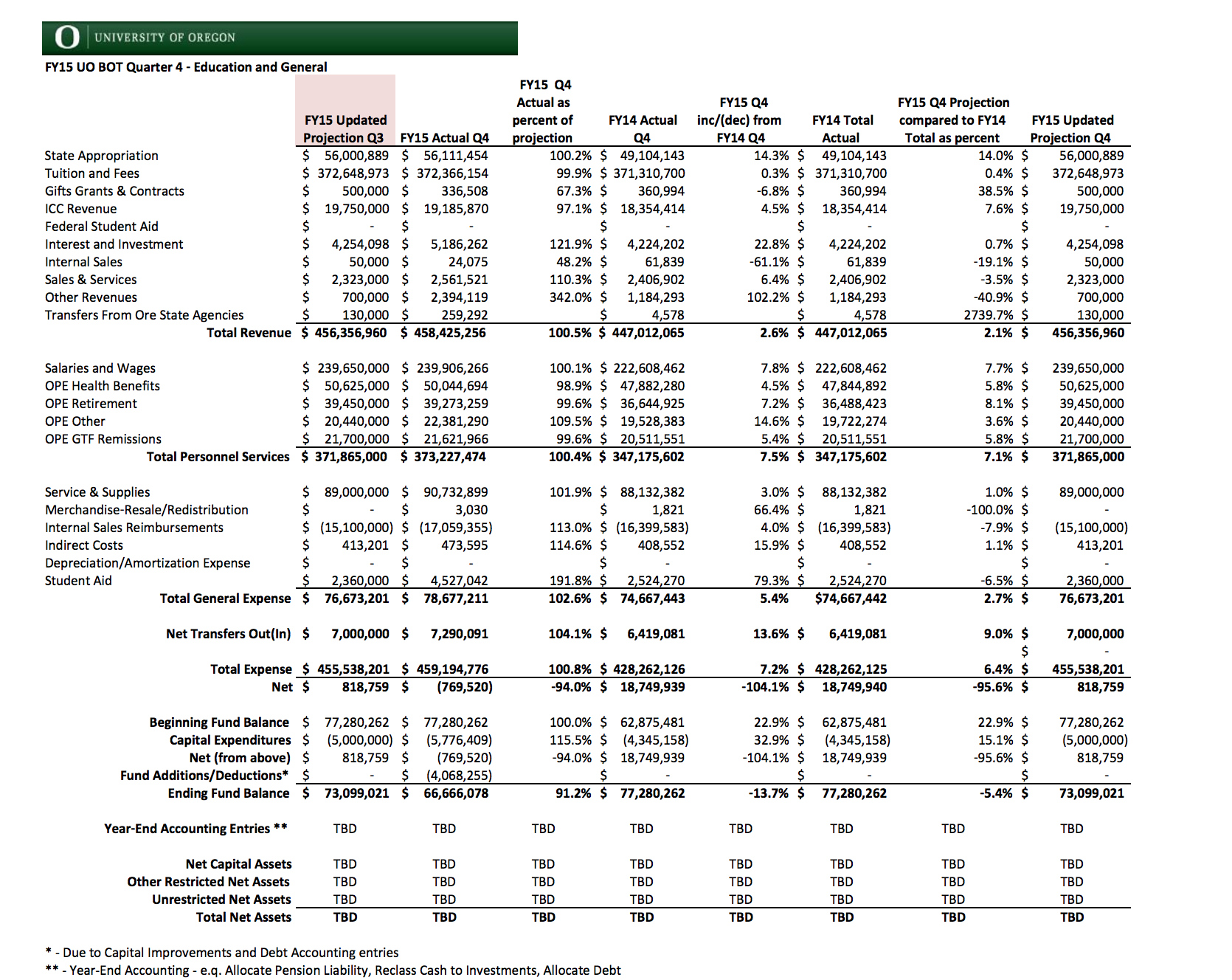
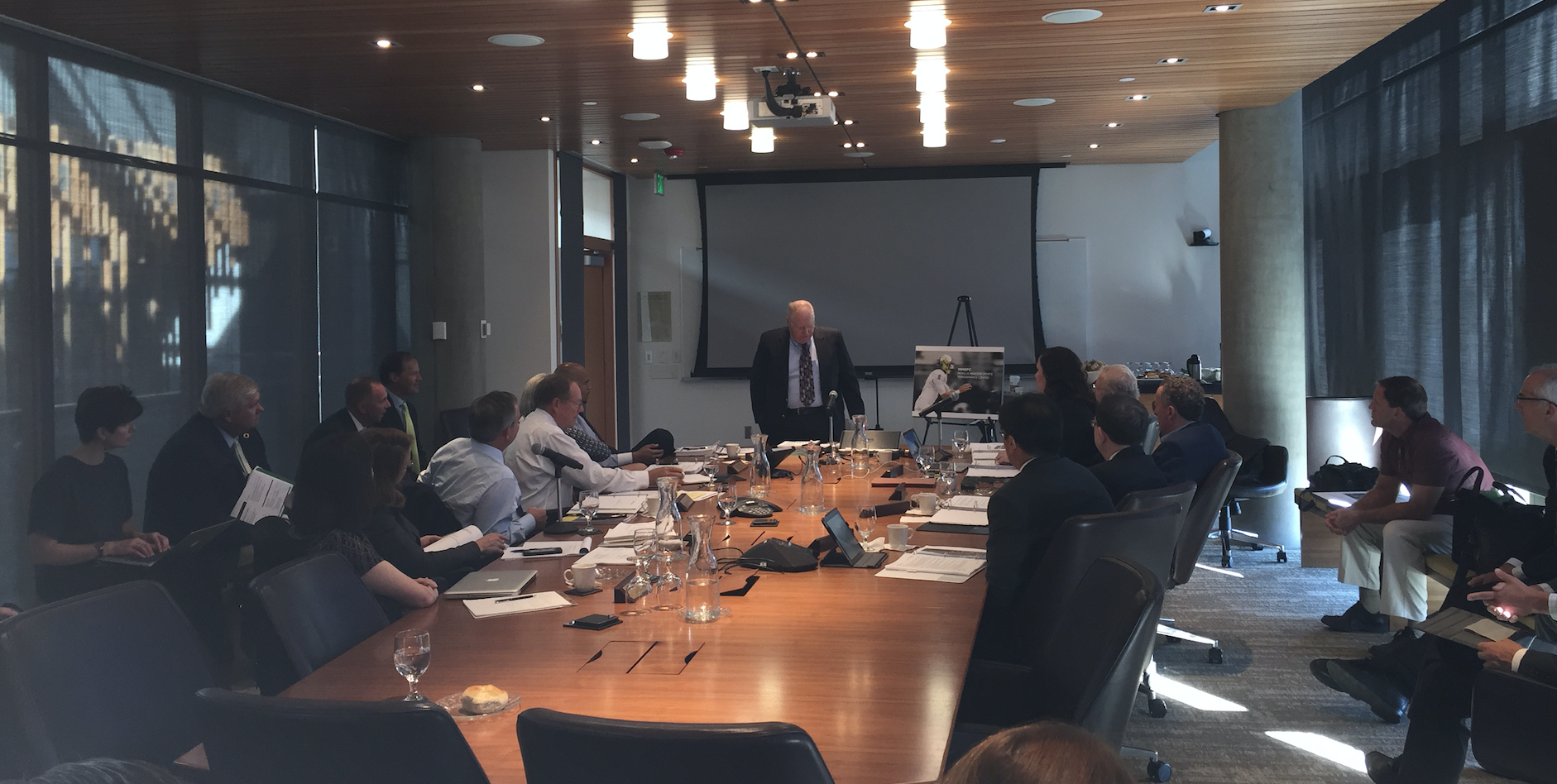
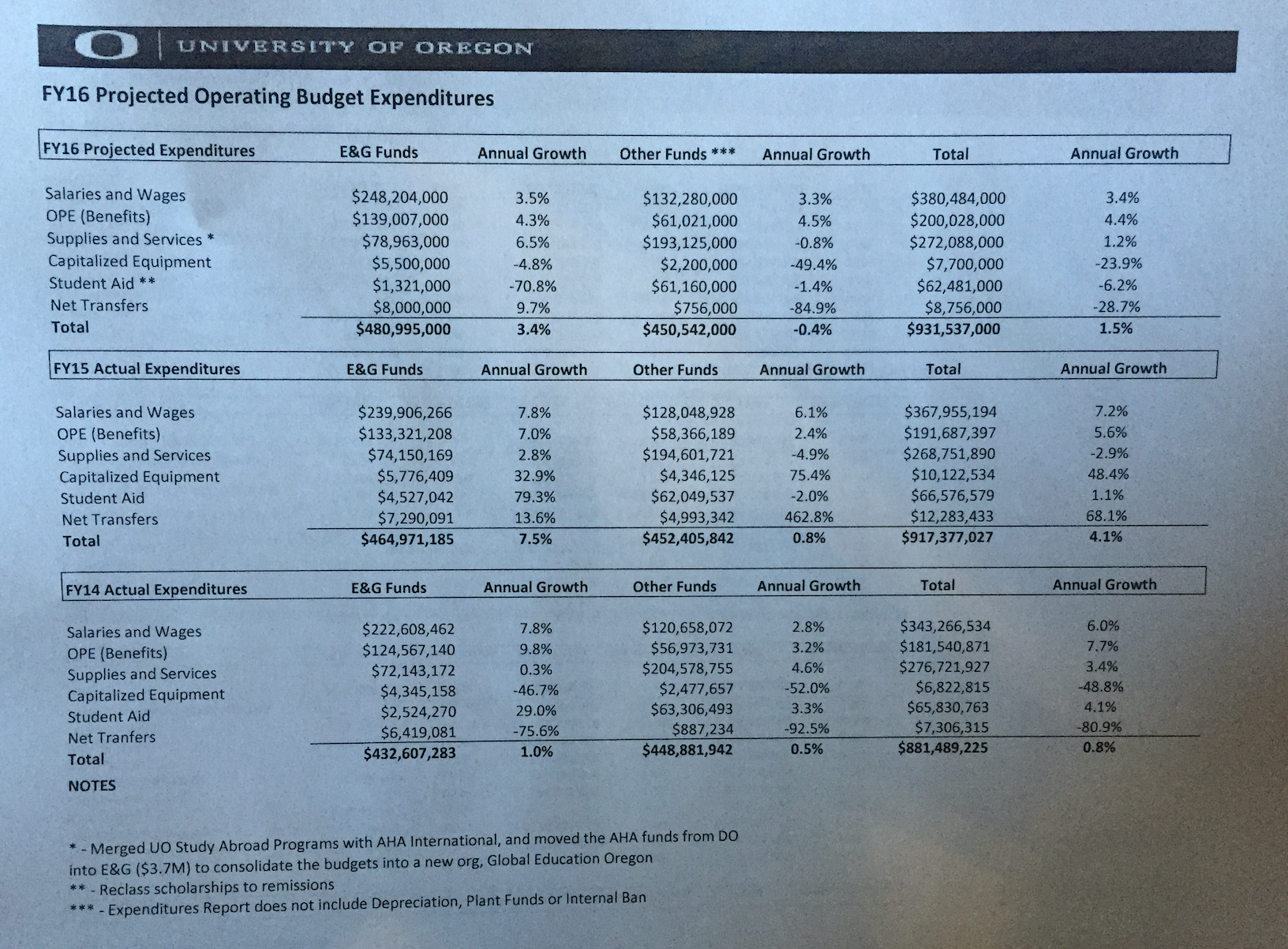
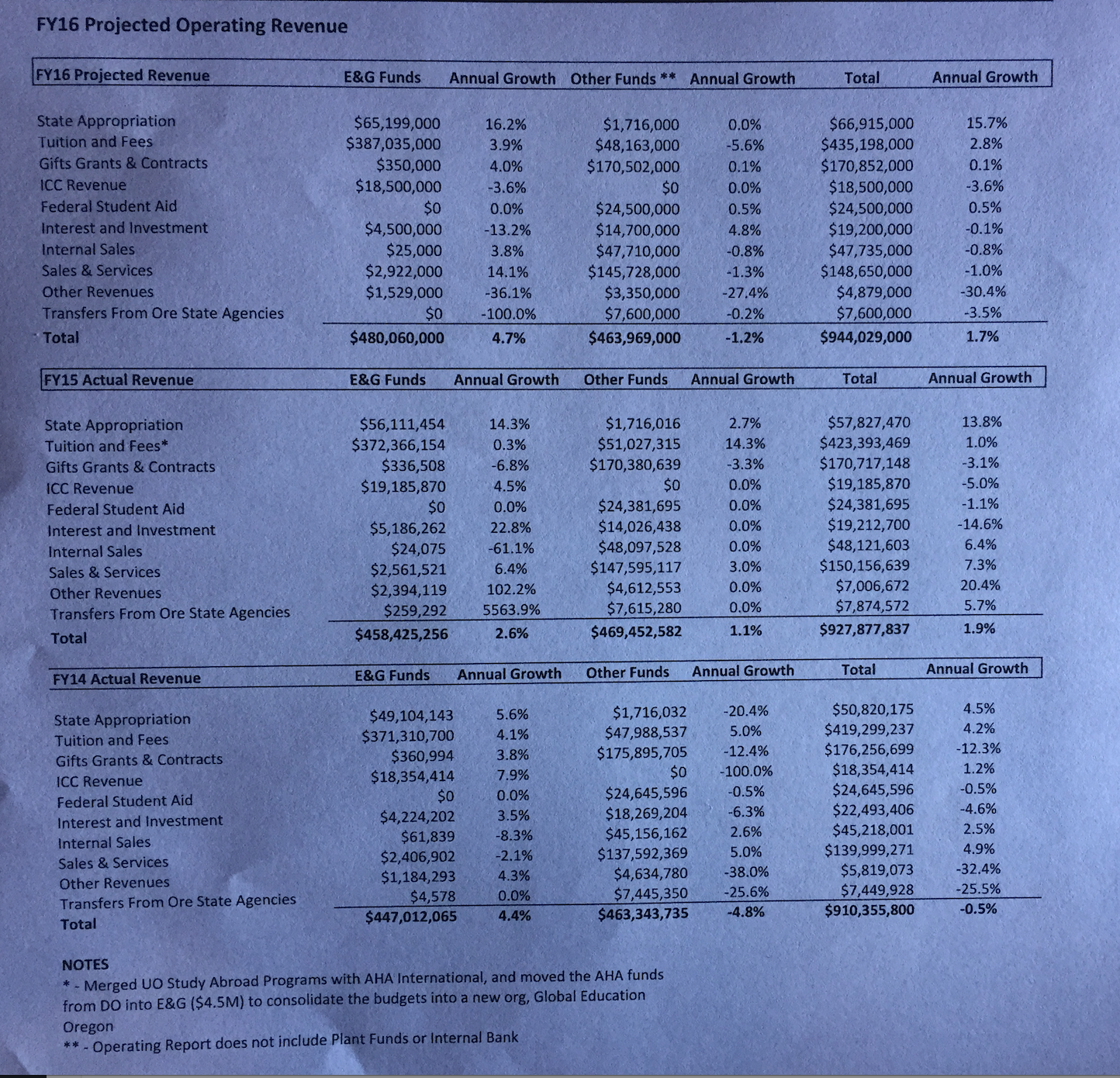
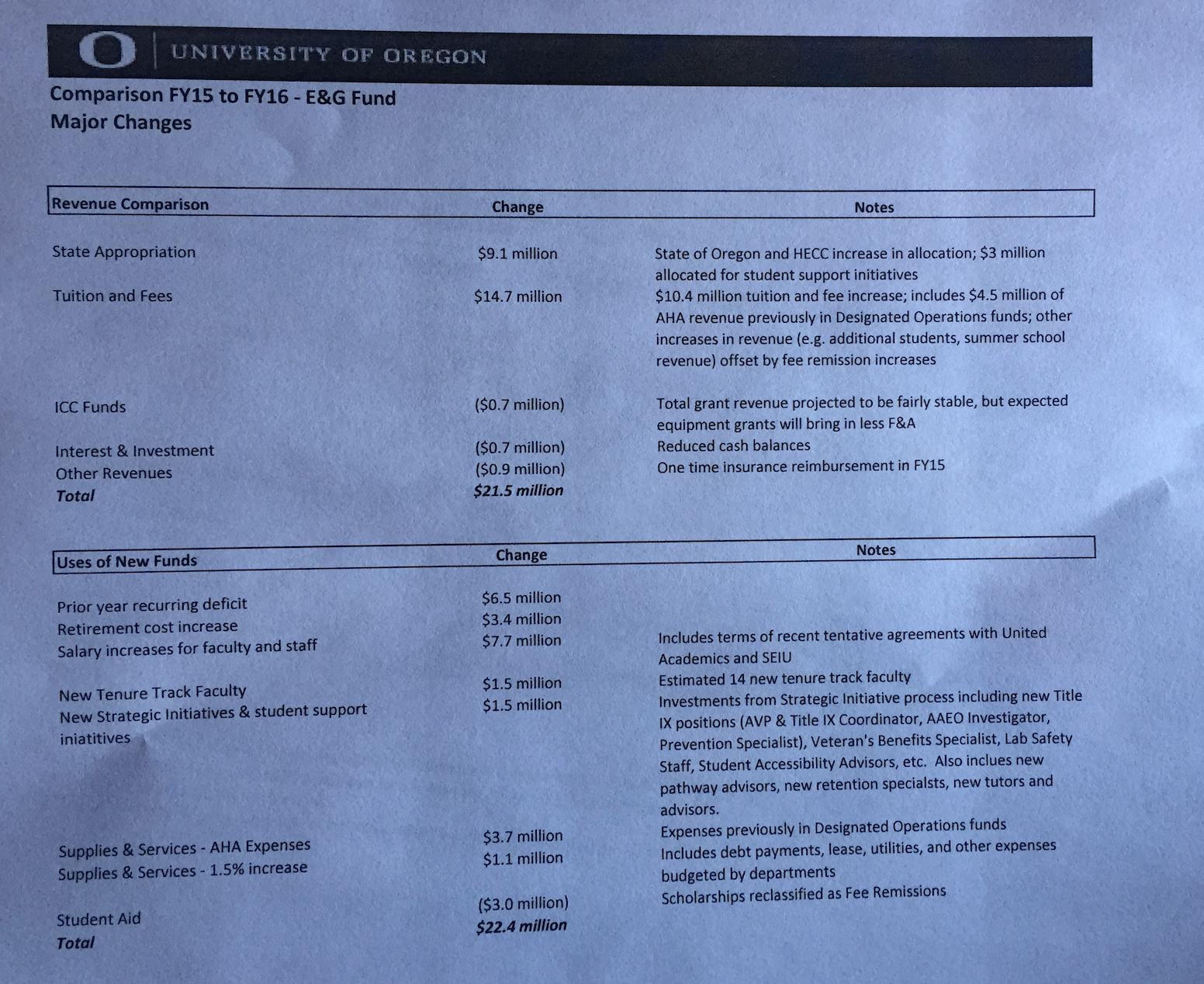
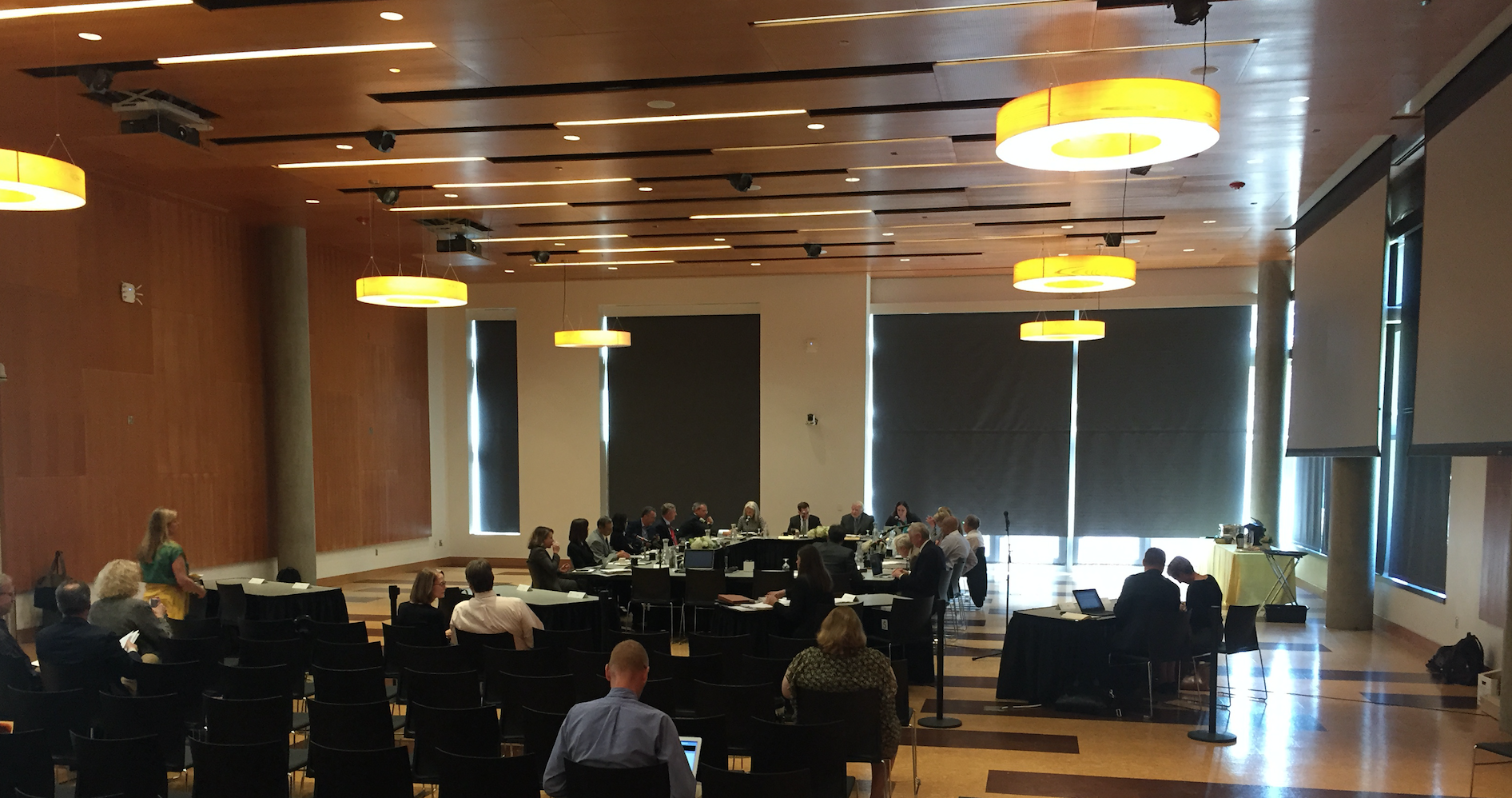
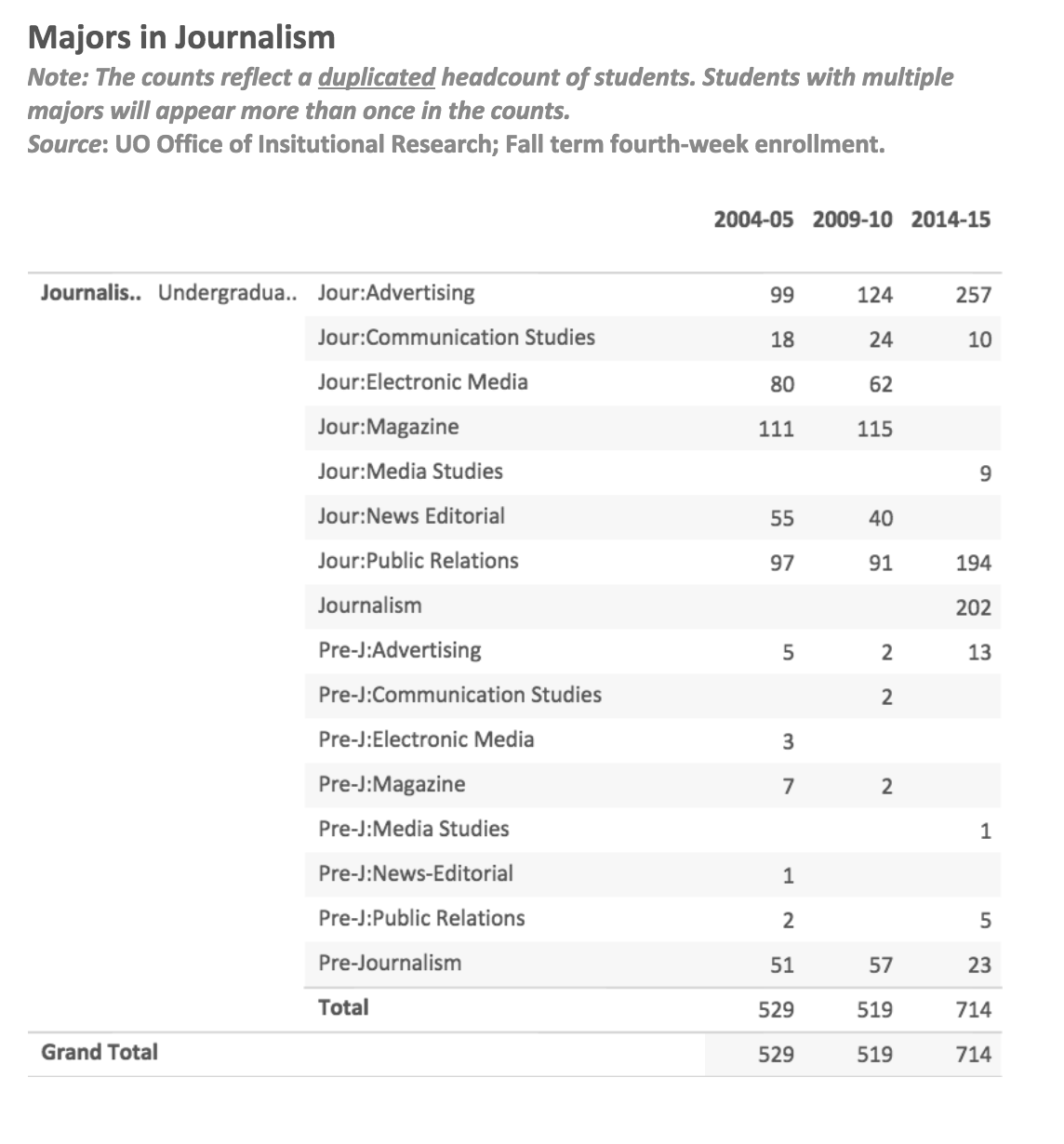
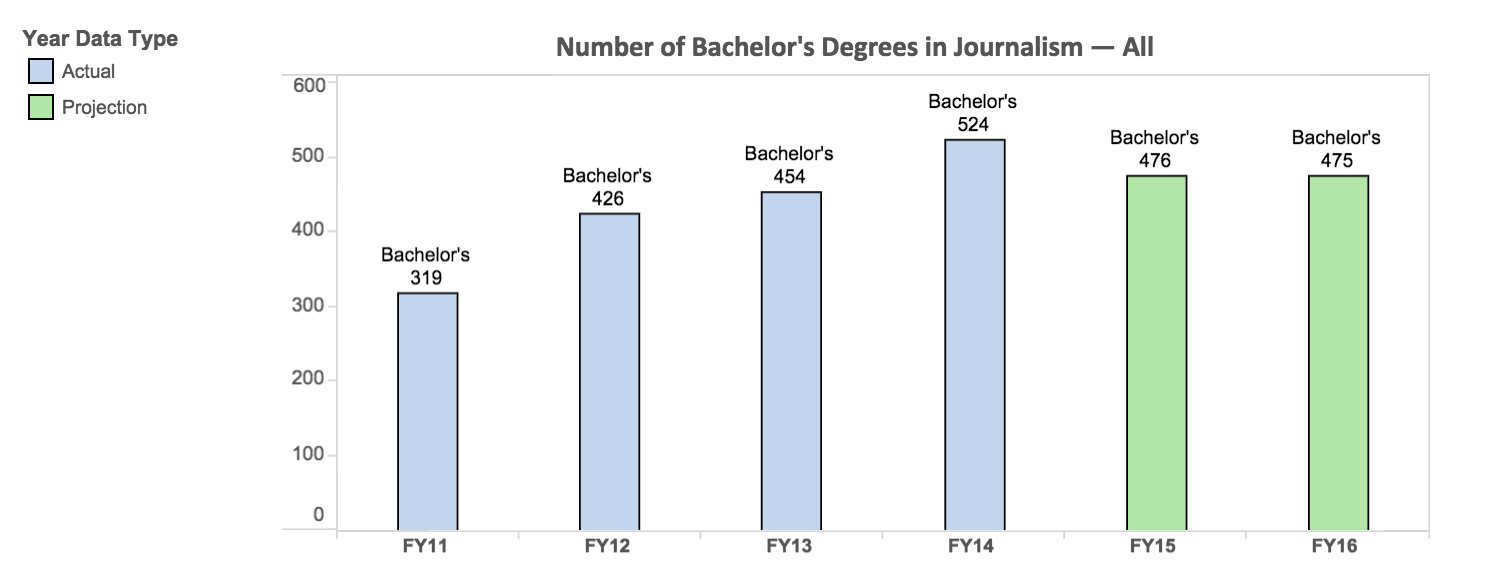
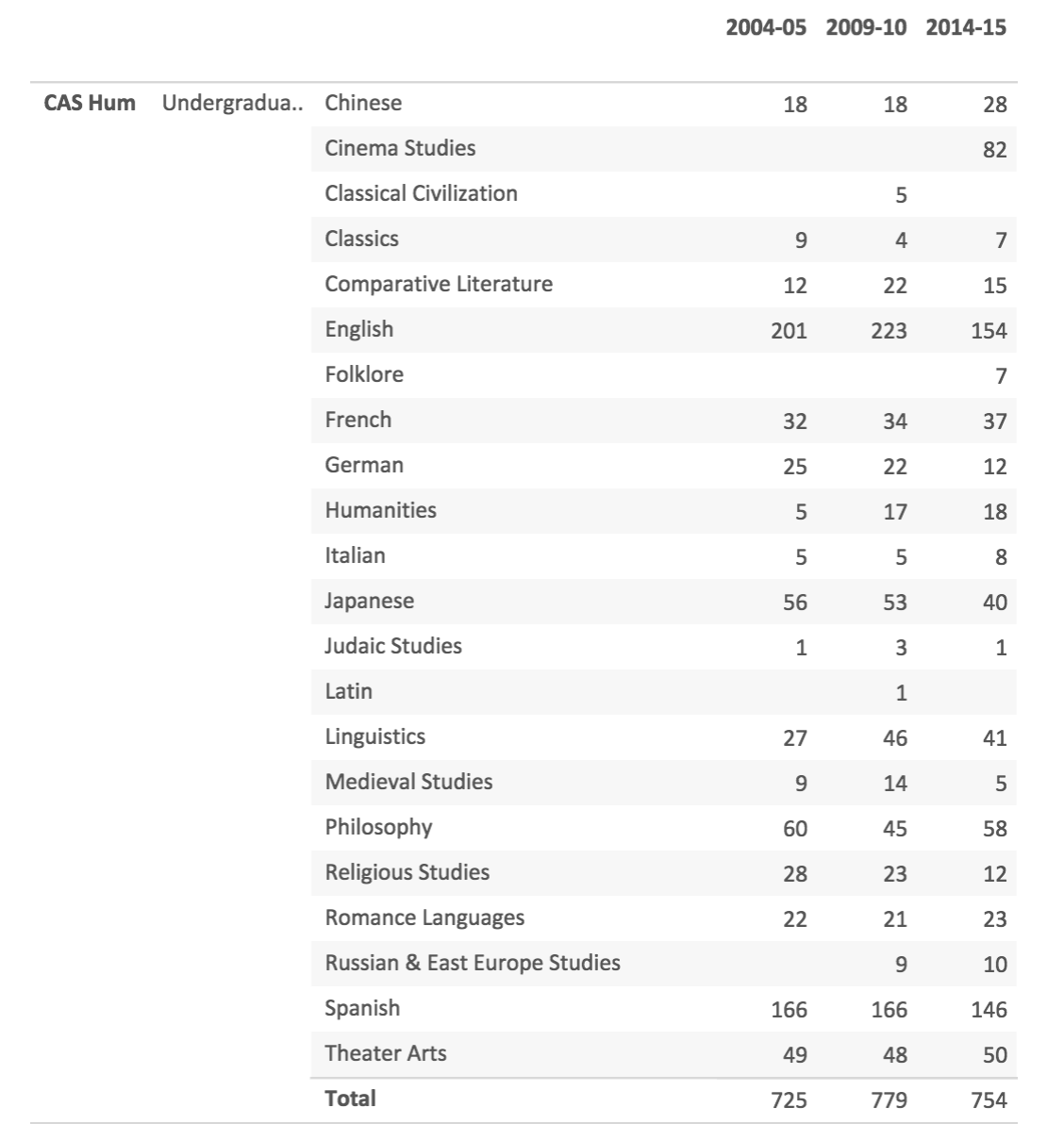
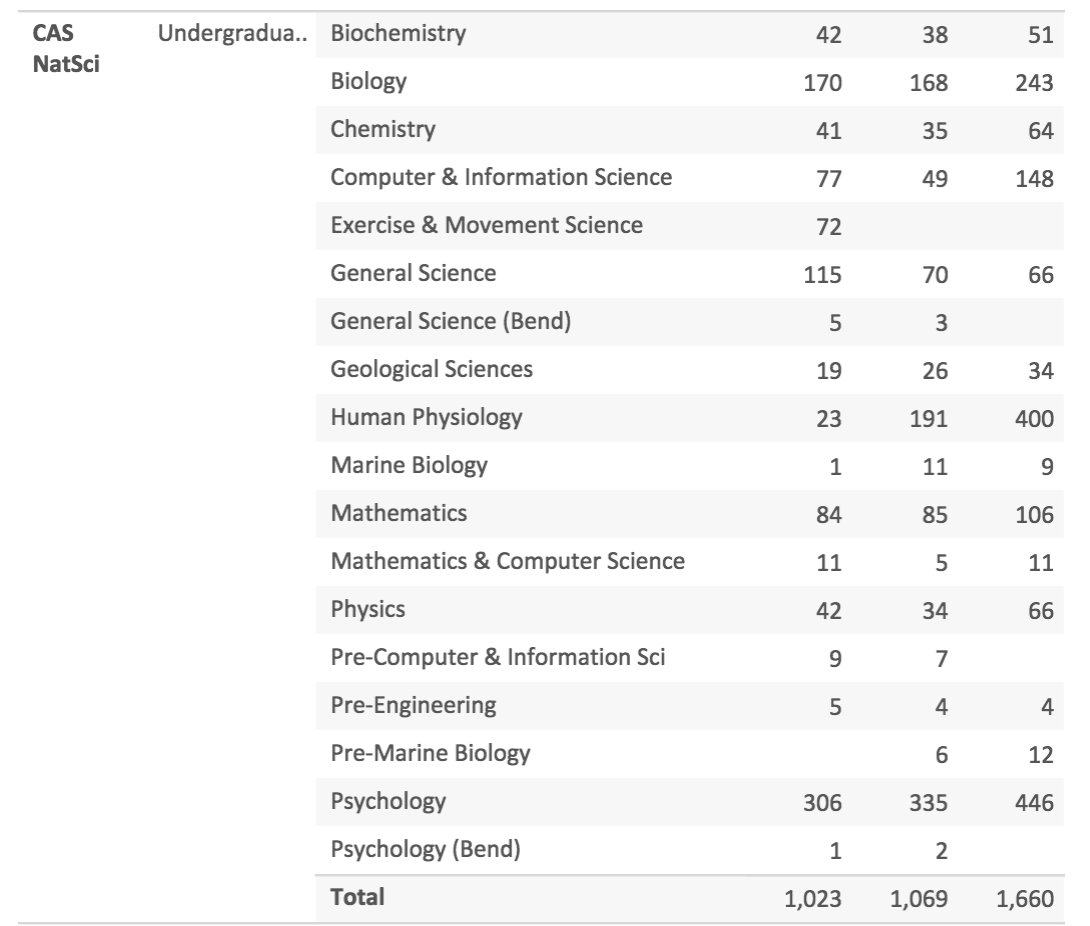


Lillis and Schill don’t need to provide cover for this because ESPN/GameDay already has the copy written glorifying the ever innovative U of Nike Athletic Dept. which exists firstly for the student athletes. (Insert shocked pic of Schill when asked if he thinks any of this is excessive. Sigh)
“Wakheed” = Joaquin Ramos, Ethnic Studies major and board member of the Oregon Student Association.
Yikes, that was a bad ear. Thanks.
Someone needs to coach Pres Schill that our Senate is not a faculty senate, but a University Senate. I’m proud of that fact.
Thanks for this, UOM. I very much appreciate being able to get at least some sense of what transpired today. You are providing a valuable public service.
Thanks. It was a long day. I could really use a drink of valuable scotch.
I thank you as well. Someday I will have to settle up with a bottle.
You’re welcome. Cheap Rye? As my attorney keeps telling me, time is of the essence.
I agree with Kitten above. Thank you.
Thanks. Bourbon would be OK too.
No – it shouldn’t…